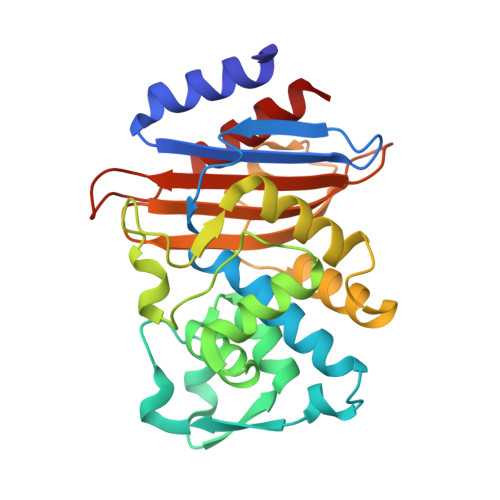Structure, Function, and Inhibition along the Reaction Coordinate of CTX-M beta-Lactamases.
Chen, Y., Shoichet, B., Bonnet, R.(2005) J Am Chem Soc 127: 5423-5434
- PubMed: 15826180
- DOI: https://doi.org/10.1021/ja042850a
- Primary Citation of Related Structures:
1YLY, 1YLZ, 1YM1, 1YMS, 1YMX - PubMed Abstract:
CTX-M enzymes are an emerging group of extended spectrum beta-lactamases (ESBLs) that hydrolyze not only the penicillins but also the first-, second-, and third-generation cephalosporins. Although they have become the most frequently observed ESBLs in certain areas, there are few effective inhibitors and relatively little is known about their detailed mechanism. Here we describe the X-ray crystal structures of CTX-M enzymes in complex with different transition-state analogues and beta-lactam inhibitors, representing the enzyme as it progresses from its acylation transition state to its acyl enzyme complex to the deacylation transition state. As the enzyme moves along this reaction coordinate, two key catalytic residues, Lys73 and Glu166, change conformations, tracking the state of the reaction. Unexpectedly, the acyl enzyme complex with the beta-lactam inhibitor cefoxitin still has the catalytic water bound; this water had been predicted to be displaced by the unusual 7alpha-methoxy of the inhibitor. Instead, the 7alpha-group appears to inhibit by preventing the formation of the deacylation transition state through steric hindrance. From an inhibitor design standpoint, we note that the best of the reversible inhibitors, a ceftazidime-like boronic acid compound, binds to CTX-M-16 with a K(i) value of 4 nM. When used together in cell culture, this inhibitor reversed cefotaxime resistance in CTX-M-producing bacteria. The structure of its complex with CTX-M enzyme and the structural view of the reaction coordinate described here provide templates for inhibitor design and intervention to combat this family of antibiotic resistance enzymes.
Organizational Affiliation:
Department of Pharmaceutical Chemistry, University of California, San Francisco, Genentech Hall, 600 16th Street, San Francisco, California 94143-2240, USA.
















